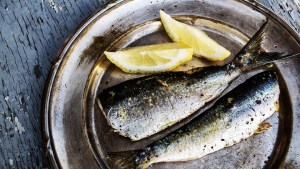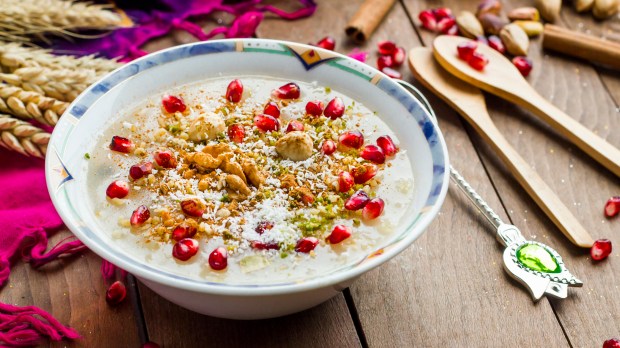One of the ways to celebrate a special occasion is with something tasty. And this has been the case for millennia. So with the festive season in full swing, why not look to an ancient dessert to celebrate Christmas in style!
In fact, long before the birth of Christ, people rustled up sweet treats for festive occasions, such as saving mankind from extinction. In fact, Islamic tradition states that Noah’s family was so relieved that they survived the Great Flood thanks to Noah’s ark-building abilities, that they decided to make a pudding.
Since the family landed on Mount Ararat, in what is now Eastern Turkey, they were restricted in what they could use for this dessert. They apparently gathered grains, legumes, fruits and nuts that remained on the ark and came up with a delicious dish called ashure.
According to the BBC, the rich dessert can be served hot or cold. It is not overly-sweet and has undertones of a porridge when warm. When it is left to chill it congeals and has a texture similar to custard.
A dessert filled to the brim with nutrition and meaning
Today the dessert still holds a lot of meaning and symbolism among the Turks and neighboring cultures, as food editor of Vogue and GQ Turkey, Cemre Torun, wrote in an article that was shared by the BBC:
“Ashure means ’10’ in Arabic and refers to the 10th day in the month of Muharram, the first month of the Islamic calendar. The dessert is cooked in homes during that week and distributed to friends, symbolising the spread of love and abundance.”
Torun also shared in more detail the different religious belief systems in Turkey over the years, which is fascinating to read. But importantly for the food editor, the dessert is indicative of the types of cooking in the Anatolian region.
“The presence of ingredients like chickpeas and beans showcases the importance given to balance and flavours, emphasis on abundance and prosperity, how nutritious the cuisine is in this region, and the importance of the pantry in our kitchens. They are always filled with all kinds of beans, lentils, grains and seeds.”
The rather nutritious and filling dessert can be adapted to include various fruits and nuts. And as there is so much history surrounding the dish, lots of families will have their own special versions that their ancestors would have perfected and shared with their neighbors, and continue doing so today.
Yet, Suna Cagaptay, a professor of architectural history and archaeology, goes into further detail about the Abrahamic and Islamic traditions and timings of when this ashure was made, as shared in New Lines Magazine:
“Ashure pudding has endless connotations. There is an emphasis on good and evil, which the tradition of eating it around Christmas and New Year’s or in remembrance of Abraham surviving the fire by Nimrod shows. There is also praise for the bounty and rejuvenation that the earth offers as we see in the idea of Noah’s pudding or the wheat fields that miraculously grow in the story of St. Barbara.”
Interestingly, the name of the dessert is similar to Ashura, a period when in Jewish tradition the rescue of Moses from the Pharoah was celebrated. Shia Muslims celebrate Ashura a few days before Ramadan, when the martyrdom of al-Husayn, the son of Ali and Fatima and the grandson of the Prophet Mohammed, is commemorated.
With the dessert holding so much meaning for thousands of years, in various religious belief systems, it’s difficult to discern one particular recipe, as so many are adapted to family tastes and available ingredients. So if you’re not able to hop on a plane and try one in a Turkish dessert shop, you could try out this one from Spruce Eats.



